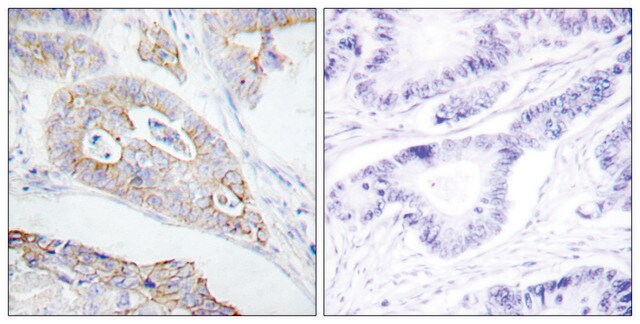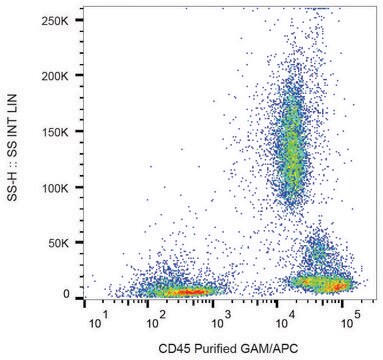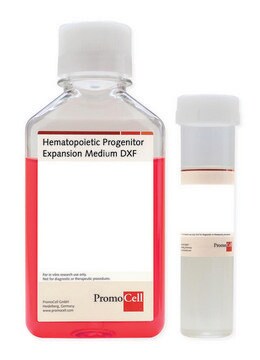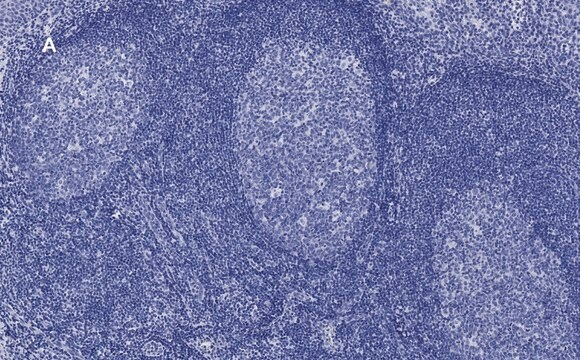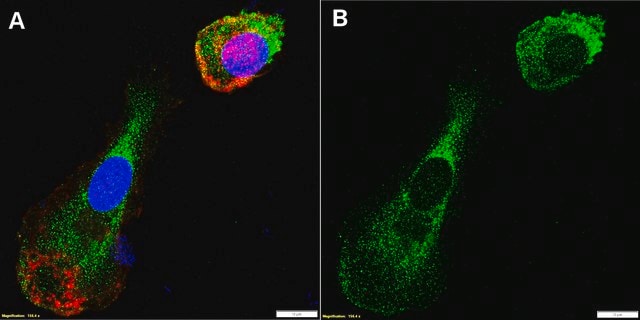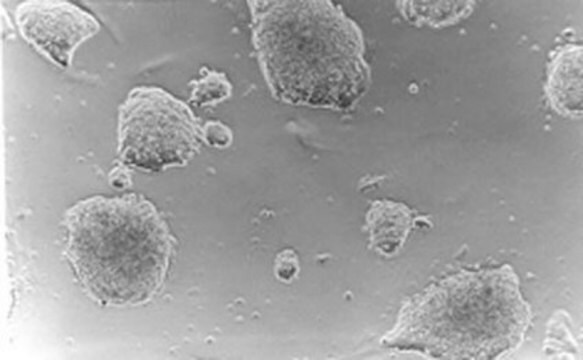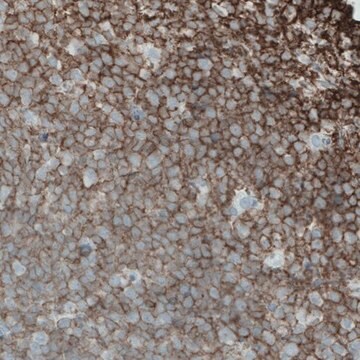SAB4700471
Monoclonal Anti-CD45 antibody produced in mouse
clone MEM-28, purified immunoglobulin, buffered aqueous solution
Synonym(s):
Anti-LCA, Anti-PTPRC
Sign Into View Organizational & Contract Pricing
All Photos(1)
About This Item
UNSPSC Code:
12352203
NACRES:
NA.41
Recommended Products
biological source
mouse
Quality Level
conjugate
unconjugated
antibody form
purified immunoglobulin
antibody product type
primary antibodies
clone
MEM-28, monoclonal
form
buffered aqueous solution
species reactivity
human
concentration
1 mg/mL
technique(s)
flow cytometry: suitable
isotype
IgG1
NCBI accession no.
UniProt accession no.
shipped in
wet ice
storage temp.
2-8°C
target post-translational modification
unmodified
Gene Information
human ... PTPRC(5788)
Related Categories
General description
The antibody MEM-28 reacts with all alternative forms of human CD45 antigen (Leukocyte Common Antigen), a 180-220 kDa single chain type I transmembrane protein expressed at high level on all cells of hematopoietic origin, except erythrocytes and platelets.
Immunogen
Human thymocytes and T lymphocytes
Application
The reagent is designed for Flow Cytometry analysis. Suggested working dilution for Flow Cytometry is 1 μg/mL of sample. Indicated dilution is recommended starting point for use of this product. Working concentrations should be determined by the investigator.
Features and Benefits
Evaluate our antibodies with complete peace of mind. If the antibody does not perform in your application, we will issue a full credit or replacement antibody. Learn more.
Physical form
Solution in phosphate buffered saline, pH 7.4, with 15 mM sodium azide.
Disclaimer
Unless otherwise stated in our catalog or other company documentation accompanying the product(s), our products are intended for research use only and are not to be used for any other purpose, which includes but is not limited to, unauthorized commercial uses, in vitro diagnostic uses, ex vivo or in vivo therapeutic uses or any type of consumption or application to humans or animals.
Not finding the right product?
Try our Product Selector Tool.
Storage Class Code
10 - Combustible liquids
Flash Point(F)
Not applicable
Flash Point(C)
Not applicable
Choose from one of the most recent versions:
Already Own This Product?
Find documentation for the products that you have recently purchased in the Document Library.
Bo Peng et al.
The Journal of neuroscience : the official journal of the Society for Neuroscience, 34(24), 8139-8150 (2014-06-13)
Retinitis pigmentosa (RP) is a photoreceptor-degenerative disease caused by various mutations and is characterized by death of rod photoreceptor cell followed by gradual death of cone photoreceptors. The molecular mechanisms that lead to rod and cone death are not yet
Nanna Siegmann et al.
Cellular physiology and biochemistry : international journal of experimental cellular physiology, biochemistry, and pharmacology, 34(1), 56-70 (2014-07-01)
Inflammation is a major and critical component of the lung pathology in the hereditary disease cystic fibrosis. The molecular mechanisms of chronic inflammation in cystic fibrosis require definition. We used several genetic mouse models to test a role of iNKT
Brian Meehan et al.
Mechanisms of ageing and development, 140, 13-22 (2014-07-30)
Antiangiogenic therapies in cancer exert their effects in the context of age-related comorbidities, which affect the entirety of the vascular system. Among those conditions, the impact of atherosclerosis is especially prevalent, but poorly understood, and not reflected in mouse models
Mohammad Atefi et al.
Clinical cancer research : an official journal of the American Association for Cancer Research, 20(13), 3446-3457 (2014-05-09)
PD-L1 is the main ligand for the immune inhibitory receptor PD-1. This ligand is frequently expressed by melanoma cells. In this study, we investigated whether PD-L1 expression is controlled by melanoma driver mutations and modified by oncogenic signaling inhibition. Expression
S Badrnya et al.
Thrombosis and haemostasis, 112(1), 128-136 (2014-02-28)
Circulating plasma microvesicles (PMVs) and their microRNA content are involved in the development of atherosclerosis and could serve as biomarkers for cardiovascular disease (CVD) progression. However, little is known on how smoking influences the levels of PMVs and microRNA signatures
Global Trade Item Number
| SKU | GTIN |
|---|---|
| SAB4700471-100UG | 4061837016554 |
Our team of scientists has experience in all areas of research including Life Science, Material Science, Chemical Synthesis, Chromatography, Analytical and many others.
Contact Technical Service
